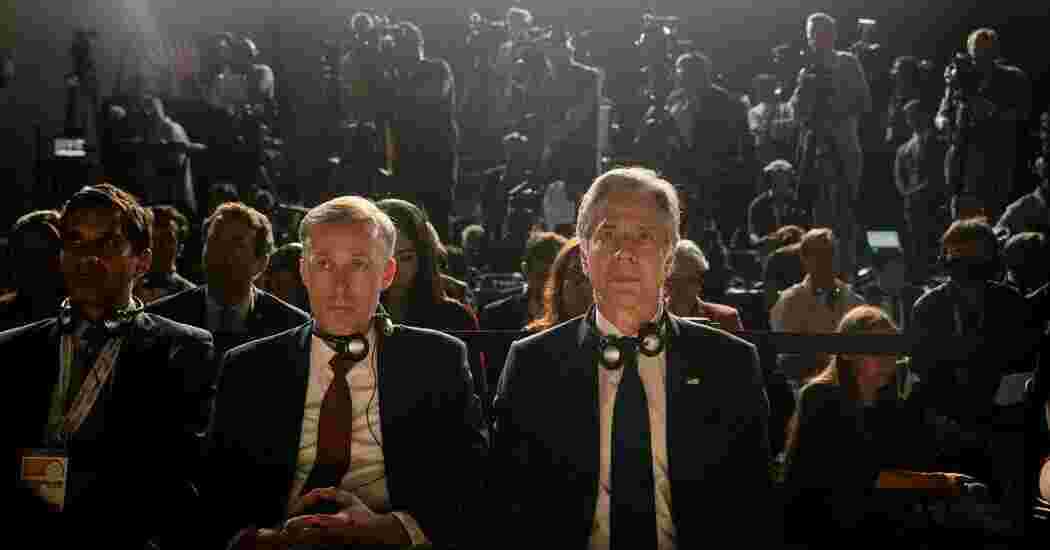Middle East Crisis: Israel-Hamas War, Israel-Hezbollah Tensions, U.S.S. Eisenhower Deploys, Key Diplomatic Figure Emerges
Blinken: Gaza Cease-Fire Agreement ‘Within Reach’
U.S. National Security Adviser Jake Sullivan took a cautious stance while Secretary of State Antony J. Blinken expressed optimism about a potential cease-fire agreement in Gaza, as they prepared for a consequential visit next week by Israeli Prime Minister Benjamin Netanyahu to Washington.
Reporting from Aspen, Colorado on July 19, 2024, Blinken stated that negotiations for a hostage release and cease-fire were “inside the 10-yard line.” However, Sullivan tempered this optimism, noting that there was no expectation of reaching an agreement before Netanyahu’s scheduled address to a joint session of Congress on Wednesday—a speech that some officials worry could complicate progress towards an arrangement with Hamas.
Sullivan emphasized that President Biden would focus on advancing the cease-fire negotiations during his talks with Netanyahu, stating, “We are mindful that there remain obstacles in the way, and let’s use next week to try to clear through those obstacles.” The officials did not address how Biden would balance the ongoing crisis with his re-election campaign while managing relations with Netanyahu.
Their updates centered on the complex and often frustrating discussions surrounding a cease-fire deal similar to Biden’s proposal from May. U.S. officials are aiming to pressure Hamas into a negotiated halt to violence and the release of Israeli and other hostages taken during the October 7 attacks.
Blinken indicated a hopeful outlook, revealing that Hamas had agreed to the framework proposed by Biden, while acknowledging that finalizing the details—such as security arrangements and plans for governance and humanitarian relief in Gaza—has proven more time-consuming than anticipated. “When I say we are inside the 10-yard line, we are,” Blinken remarked, adding, “The last 10 yards are often the hardest.”
He insisted that Hamas must not regain control in Gaza, nor could Israel maintain its occupation. “What we can’t have is an agreement that leads to a power vacuum filled by Hamas or results in prolonged Israeli occupation, which they say they don’t want, or lawlessness and chaos,” Blinken asserted.
Hamas has stated it is ready to relinquish civil and police authority to an independent body. U.S. officials prefer that security responsibilities be transitioned to a Palestinian force allied with the West Bank-based Palestinian Authority, though Hamas maintains it will not disband its security forces.
Prior to the attacks on October 7, negotiations were underway for a groundbreaking agreement between Israel and Saudi Arabia that would have recognized Israel, potentially laying the groundwork for improved Palestinian conditions without explicitly calling for a Palestinian state, a longstanding opposition of Netanyahu’s. Since the attacks, U.S. officials have emphasized the need for a viable path to a Palestinian state to support post-cease-fire stability, but progress is stymied without a cease-fire in place.
Responding to questions about the feasibility of a future Palestinian state, Blinken humorously paraphrased Senator John McCain, stating, “It’s always darkest before it goes completely black,” before affirming that hopes for an independent Palestinian state “can’t be” extinguished.
Sullivan characterized Netanyahu's upcoming address as distinct from his 2015 speech, which undermined support for the Iran nuclear deal, asserting that this time the themes within Netanyahu’s speech would align with U.S. policy. Sullivan, who did not expect to see the speech beforehand, mentioned that discussions with Israeli representatives had provided a broad preview of its content.
Both Blinken and Sullivan also addressed the U.S. commitment to Ukraine, sidestepping the potential risk posed by Donald Trump and JD Vance’s election in November, which could threaten continued American aid. They highlighted growing cooperation among U.S. allies in Europe and Asia to support Ukraine.
They also underscored concerns about China’s role in supplying Russia with military technology, noting an orchestrated intelligence-sharing campaign in Europe that led to a rare joint statement demanding Beijing cease its support.
Additionally, U.S. officials alerted that Russia might respond to American military assistance to Ukraine by providing arms to the Houthis in Yemen, further complicating Middle Eastern dynamics. General Charles Q. Brown Jr., Chairman of the Joint Chiefs, refrained from confirming reports on the intelligence but emphasized the U.S. preference against such escalation.
Reported by David E. Sanger and Julian E. Barnes
David E. Sanger has covered the Biden administration and national security for over four decades, while Julian E. Barnes has reported on U.S. intelligence and international security matters for more than 20 years.
Blinken Says Gaza Cease-Fire Deal Is ‘Inside the 10-Yard Line’
The national security adviser, Jake Sullivan, was more cautious as both spoke ahead of next week’s visit to Washington by Prime Minister Benjamin Netanyahu of Israel.





